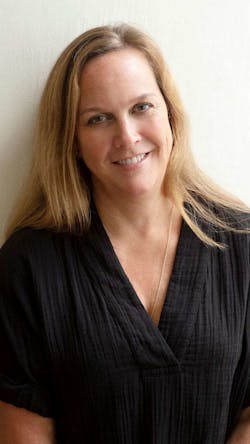Trades Talk: 5 Women Discuss Their Industry Career Paths
By ELIZABETH JOYCE, Channel Marketing Manager, Owens Corning
Whether engineer, installer or journeywoman, one thing is clear – women are increasingly contributing their technical, mechanical, and entrepreneurial skills to the skilled trades sector.
Tradeswomen’s work often complements the work being done by their female counterparts in the engineering sector. Similar to engineering, women’s representation in the trades remains low, but it is growing slowly. According to the National Association of Women in Construction, female participation in the U.S. construction sector increased from 8.9% in 2014 to 9.9% in 2018.1 Like many sectors of the economy, future employment numbers will likely show some shifts due to the global pandemic’s influence on the labor pool. The enduring labor shortage amplifies the need to get the word out about the many career opportunities available in the skilled trades and in STEM careers.
Opportunities to increase women’s participation are being explored in a range of industry niches. To learn how the industry can do a better job of spotlighting the opportunities the mechanical insulation sector offers to women, Owens Corning decided to go to the source – women working in the trades, as business owners and in engineering.
We recently spoke with five women who are applying their skills and knowledge in the construction sector, whether as installers on the jobsite, guiding strategic business operations or providing technical support to guide specifications. We asked each woman about her experience in an exceptional industry. The women shared what attracted them to the mechanical insulation sector, how mentors have helped guide their careers, and how employers can do a better job of recruiting women into the trades and engineering.
Below, these women talk about working in an industry that is anything but ordinary and where no two days are ever the same.
Meet the conversation participants:
Mackenzie Michalski, Technical Services Engineer, Owens Corning® FOAMGLAS®: Construction comes naturally to Mackenzie whose family owned a commercial contracting business. Now, as a technical services engineer, she brings a holistic approach to her role, helping engineers evaluate how the components of an insulating system including coatings, adhesives, and jacketing, work together to support industrial processes across extreme temperature ranges and diverse applications;
Laura Dover, Dover Insulation, Marion, NC: Laura grew up in the insulation business. Following her father’s passing 17 years ago, she entered the family business of insulation contracting. Today, she is owner and president of Dover Insulation, a member of the National Insulation Association (NIA) executive committee, and previously served as the first female president of the Southeastern Insulation Contractors Association (SEICA);
Ashley Tumberger, Premier Mechanical Products, Kansas City, KS: Ashley has been an entrepreneur since 2012 when she started Premier Mechanical Products. Since then, her company has grown into a 25,000-sq-ft facility, supplying custom insulation for high-profile projects including the Kansas City International Airport, Loewes Kansas City Hotel, and multiple Veterans Affairs hospitals. Her career in the insulation sector spans more than 15 years;
Lindsey Skeie, McCormick Insulation, Inc. Minneapolis: As a journeywoman with Local 34, Lindsey enjoys the autonomy of completing projects in the field, but also the social connection that comes from working with her shop’s project manager and the mechanical contractors who subcontract her skills;
Lisa Skenzich, Enervation, Inc., Minneapolis: Lisa’s career in the construction sector spans 34 years, including 20 years as a mechanical installer. Her responsibilities include insulating piping and ductwork in a variety of construction settings. Hospitals and multi-family construction projects are keeping her particularly busy at the moment.
Listen in on the conversation...
What led you to a career in the insulation industry?
Mackenzie: Growing up, I worked in my family’s commercial contracting business. I like bringing creative and innovative approaches to complex problems like building performance. While we are surrounded by insulation in buildings, we often overlook all that it can do to save money and help buildings perform better. As an engineer, I get to use my technical training but also my experience as an inside sales rep to talk engineer-to-engineer about identifying the solution that will help meet their desired specification.
Laura: After my father passed away, my two sisters and I decided to keep the business he had spent his life building. I eventually bought out my sisters and embraced the life of an insulation contractor.
Ashley: I grew up in the insulation business and always knew I wanted to be a business owner. When the opportunity arose, I took the leap and never looked back!
Lindsey: My dad introduced me to the insulation craft. He thought it would be a good fit for me because there is a certain amount of “art” to the work. I’ve always been interested in artistic processes.
Lisa: I got into the business following high school. I like working in different environments, installing insulation on different job sites, and learning from different people. I’m not a sit-at-the-desk kind of person and I like staying active and busy. Working in this field helps me stay fit and always keeps me busy.
Did you have mentors who guided or influenced your career?
Mackenzie: Owens Corning’s mentoring program paired me with a mentor who really helped me develop the business acumen side of my job. Eventually, I’d like to earn an MBA. But mentoring is important because it helps newer team members understand how others have dealt with difficult problems or adapted to changes.
Laura: My father was spot-on with his business sense and decision-making. I try to imagine what he would do. A benefit of working in a 60-year-old company is that we’ve usually come across a similar job or situation over the years. Dover has some remarkable long-term employees who have mentored me. Sandra Allison, who runs the office and is our buyer, inspires me and has been teaching me something daily since day one.
Ashley: I’ve had many different mentors who have offered their expertise to help me grow the business. These people have also supported me in areas of personal growth.
Lindsey: I had not one mentor, but many. Our International Association of Heat and Frost Insulators, Local 34, program was designed for us to work alongside many journeypersons and in different companies across a four-year program. Along the way, I have met a lot of very skilled insulators who were willing to share their knowledge. I am still in contact with a few and know that I can call them whenever a question arises.
Lisa: A woman in our union who mentored me and helped a lot of other women. She was one of the first women in our local and was always there to answer questions or provide helpful direction. When I first started insulating, I worked for and learned from my dad. So he was my first mentor.
How can construction firms make the trades more appealing to women?
Mackenzie: Just as people don’t realize how much insulation supports efficiency and savings in buildings, they don’t see the breadth and diversity of opportunities depending on market niche. For example, I support system specification development for industrial processes with temperatures that range from -450˚F to 900˚F, indoor, outdoor, above ground and below. The diversity and complexity of applications keeps my day-to-day interesting, as well as the opportunity to collaborate with other engineers to arrive at an optimal spec to help a customer.
Laura: Don’t define a career in terms of gender, but rather in terms of work ethic, skill, and effort. Compensate women fairly and equally. Offer the same incentives and training opportunities that are available to men. And understand that flexibility is important with regards to achieving balance between life and work. Employers need to create work environments that are safe and professional, both on the jobsite and in the office.
Ashley: Some organizations are better than others about promoting diversity and inclusion in the trades. Many times, we get our career support from our peers and there tends to be more men than women working in this business. The way I address this challenge is to encourage young women to pursue construction careers. There are obstacles and challenges, but that is how we learn, grow, and thrive.
Lindsey: We need to do more to highlight the successful life most of us in the trades live. Unfortunately, American society at large has a bad image of what a tradesperson looks, acts, and sounds like. I also think companies can do a better job of promoting women once they enter the trade. Advancement can change the perception of women in construction if we are seen as valuable from the top down. I don’t see enough female sales associates, project managers, business owners, etc.
Lisa: Women need to know more about the insulation business and the work required to do the job. Some women don’t think they can do the work from a physical perspective. It’s nothing any woman couldn’t handle. Insulation is pretty light and doesn’t require super heavy lifting or physical activity. Some women may worry they won’t be treated nicely, but I’ve had good experiences over the past 34 years.
How has the pandemic influenced your work over the past two years?
Mackenzie: I finished my bachelor’s degree at the University of Toledo three years ago and started my career as an inside sales representative. During the pandemic I transitioned into my role as a technical service engineer and customer contact became strictly virtual, presenting some new challenges for communicating. Since the start of 2022, I’m in the headquarters office more frequently.
Laura: We saw a roller coaster of painful slowdowns and frantic upticks in work last year, depending on the phase of the pandemic. Like everyone else, we are hiring and challenged to find workers. I am pleased that we have more women in our workforce than ever before, both in our office and in the field. For women who are motivated, ready to learn a trade, and willing to work hard, there has never been a better time to find opportunities in both entry level and management positions.
Ashley: The pandemic definitely affected work interactions with people outside our organization, but we kept our heads down and did our jobs. Many women felt the at-home demands increase as their children were out of school and doing virtual learning.
Lindsey: Construction workers were considered essential workers from the start of the pandemic. Some parts of our trade have been affected more than others by it. Hospitality and retail projects obviously were way down. But overall, I think most people were able to find work if they felt comfortable doing so. In-person recruiting events stopped for a year, so there will be a ripple effect when it comes to bringing more women into the industry. I think a lot of hardworking ladies would love the opportunity to join the trades. We just need to do a better job of knowing where and how to reach them.
Lisa: I saw little impact. In fact, I have been working from the first day things shut down.
What are some positive signs you see now in the workplace?
Mackenzie: Both mentoring and having a role model to look up to are really important to bring a real-world perspective to professional development. As my career evolves, I want to mentor other women in the mechanical engineering or building science space. And I’d like to open people’s eyes to how much of a positive impact insulation can have on the world.
Laura: Women can benefit from an overall shortage of labor in construction. I believe gender barriers are decreasing and there are opportunities for women at all levels of construction. I am so proud to have served as the first female president of SEICA. It is important for women to take on leadership roles in our industry. We make up half the population, and the construction workforce should better reflect this in a variety of roles.
Ashley: I am optimistic about the trades as the younger generation is less concerned about career stereotypes and more focused on their careers, goals, and aspirations. I’m excited to see younger women taking on roles as project managers, engineers, etc. I’m seeing this trend take place from general construction through all the subcontracting trades. Barriers are being broken and that is very encouraging. There are opportunities to volunteer time, offer advice, and share knowledge or referrals. It’s important to have people on your team, cheering you on and guiding you in any areas of weakness.
Lindsey: I’ve participated in two Women Build Nations conferences for my local union and attended a few recruitment events. Our international union has been very supportive of attendance at Tradeswomen Build Nations events. Time is set aside during the conference to connect with our international union and share how they can better support and recruit more women in our trade.
Lisa: My experience has been overwhelmingly positive. Today, I don’t hear comments like one I received long ago. A man on a jobsite said I should be home with my son instead of working. I told him, "Well, he’s with his father now and you can talk to him about it. But for now, you’re stuck with me!"
##########
As America’s construction sector gains momentum and employers compete to secure talent, these women’s experiences working in the mechanical insulation sector now suggest a world of opportunity for “Jills of all trades.”
##########
1 Norberg, C., Johansson, M. “Women and “Ideal” Women”: The Representation of Women in the Construction Industry. Gend. Issues 38, 1–24 (2021). https://doi.org/10.1007/s12147-020-09257-0.




